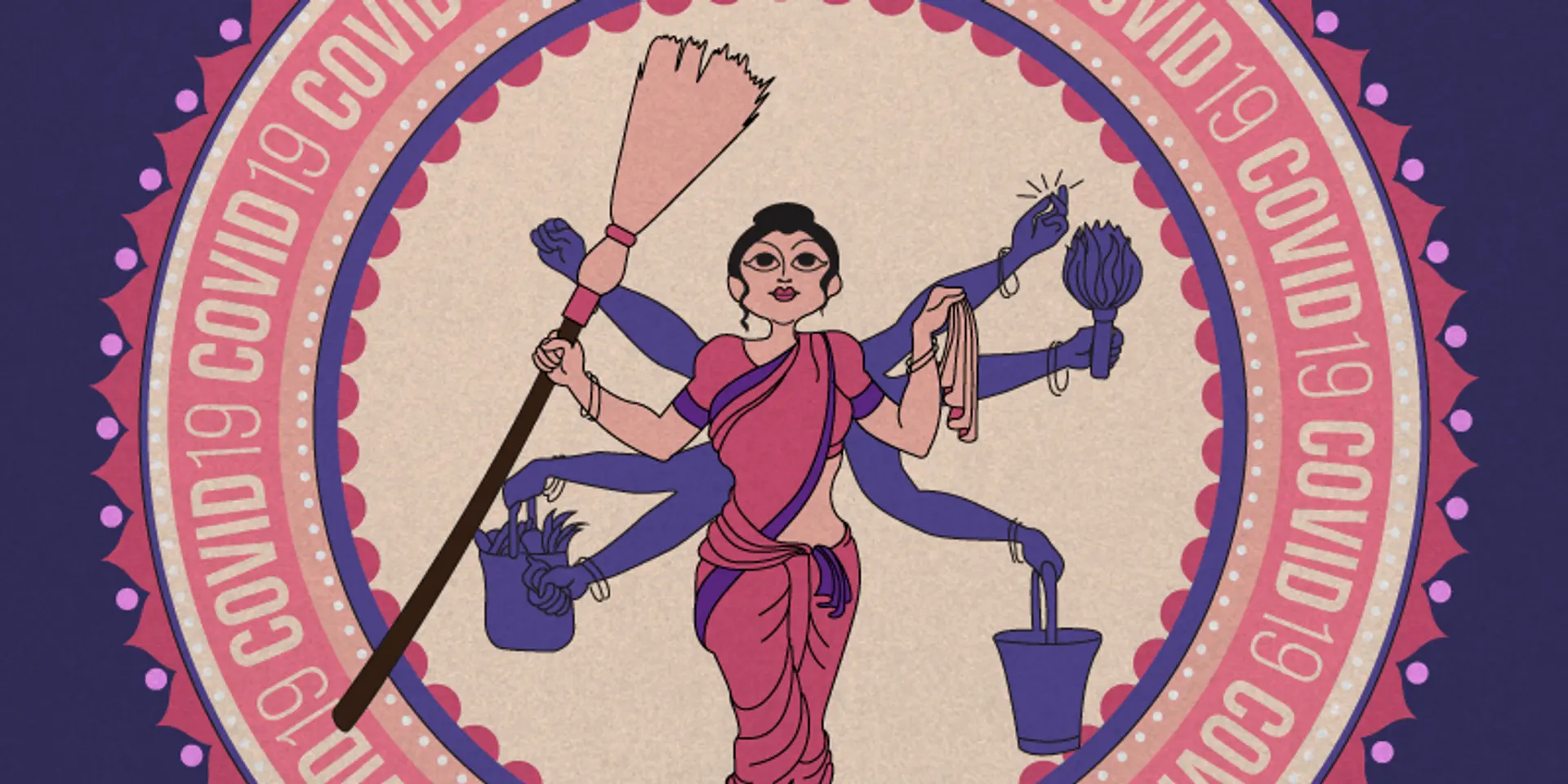In times of coronavirus, how women domestic workers are coping with work and fear
For millions of domestic workers across the country, it’s work as usual despite the fear of COVID-19. But considerate employers, constant awareness, and access to hand sanitisers and masks are helping allay some of their fears.
The area adjacent to Christ University campus in Bengaluru wears an almost deserted look. Most students have left for their homes after exams were postponed by a month. A large part of the IT population is confined to a work-from-home routine. Nearby supermarkets are seeing long queues with people stocking up on essentials. The panic surrounding COVID-19 is very real.

Image by Aditya Ranade
Karnataka has seen seven people infected with the virus so far, and one death among the 110 tested positive in the country. The government also took immediate action and announced the closure of schools, colleges, and malls throughout the state, to stop the spread of the virus.
While most of us have the option of working remotely, and access to hand sanitisers, masks, and soaps, it’s work as usual for blue-collar workers, a large number of them women.
Even in the deserted streets, you can find women pourakarmikas (BBMP workers) hard at work, sorting out garbage, sweeping, and keeping areas clean.
I approach Alavelamma, a pourakarmika of the BBMP, on the street near my home. It’s 8am and she says she’s been at work for almost two hours. She is wearing a surgical mask and so I presume she is aware of the coronavirus situation. I ask her whether she is taking any other precautions as she is not wearing any gloves while handling the dry garbage.
“Yes, the BBMP held an awareness session and gave out sanitisers and masks. They also asked us to wash our hands frequently with soap and water, inside and outside the home. We are aware that we need to be hygienic and look after ourselves,” she says.
A lady from the neighbourhood listening in on the conversation chides her for not wearing gloves. Sheepishly, she takes them out of her pocket and puts them on, while complaining they are uncomfortable to wear.
In the same area, Sasirekha works at five different houses, as a cook and domestic help. I ask her whether she knows about the coronavirus and she’s blank. She also doesn’t know what a hand sanitiser is. I proceed to give her a general overview of the situation and offer her a bottle of sanitiser. She is alarmed by the information at first, but nods in agreement and promises to be careful.
Most residential buildings, especially in gated communities in and around Bengaluru, have kept sanitisers at the entrances for people to use.
Mary*, who works in such a building, says she is careful all the time. Also, every week in her church, the pastor reinforces hygiene practices, right from washing hands, not shaking hands, not touching the face, and how to sneeze.
In Mumbai, India’s commercial capital, which houses a population of 1.84 crore, also has a large number of domestic workers.
Shanta* who works in a gated community in the city’s suburbs, is aware of coronavirus and is careful about keeping herself clean. “The building management has taken a number of preventive measures and has made us aware of maintaining hygiene personally and at work,” she says.
In Kochi, Kerala, a state that has seen an immediate and pro-active approach to tackling COVID-19 with a slew of measures from the government, awareness is very high.
Chandrika, who works as a house help says, “My employers told me all about the virus, and why I should keep washing my hands with soap and use a sanitiser. I have no option but to travel by bus to my workplaces, but I cover myself with a mask and wash as soon I reach home.”
In light of the situation, many employers too are making sure that their help is safe. Some of them have also given paid leave.
Vidhya*, from Bengaluru, has just come back from a work trip abroad and is in self-isolation. “I am giving them a week of paid leave, mainly because I’ve returned from travel and am on self-isolation and don’t want to expose them. I’ve had no contact with them from the day I arrived.”
Roopa, who lives in a Bengaluru suburb, says she gave her house help the option of paid leave, but she refused. “I got her a mask, a sanitiser, and told her all about the symptoms of COVID-19 and how it differs from regular flu.”
Gayatri Jayaraman, an author based in Mumbai, says, “I have not given leave yet but have made her aware of symptoms to watch out for in her neighbourhood, home, the houses she works at, precautions to take, and supplies to stock up. If she wants to stop coming to work, her pay won’t be cut.”
These women, who form a large part of the workforce in the country, do not have the option of staying at home. Their work in this gig economy will go on, as we need them to make our lives easier.
The least we can do is help them feel safe and allay any fears they may have regarding the coronavirus. What matters most is empathy for we are all in the same situation where we must take care of ourselves and others too.
(*names changed on request)
(Edited by Teja Lele Desai)








